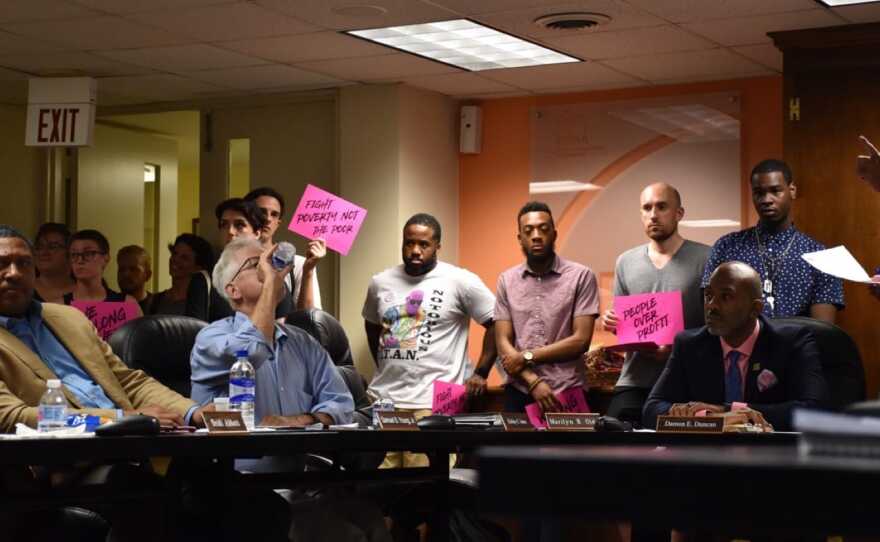This week, Richmond Redevelopment and Housing Authority (RRHA) sent their five-year plan to the U.S. Department of Housing and Urban Development (HUD) for approval. RRHA’s board advanced the plan at the June 19 meeting without a lot of resident input -- and more than two weeks before the public comment period closed.
At Wednesday’s Board of Commissioners meeting, dozens of advocates showed up, many voicing concerns that the agency failed to meaningfully involve residents in the process.
“Housing is a human right. We cannot go by this plan that our CEO has,” said Cora Hayes, a resident of the Randolph development. “You don’t have public housing for the people that need it, much less tear it down and have nowhere else for us to go.”
The five-year plan calls for the conversion of existing public housing into a voucher-based system. The housing authority would implement the proposed redevelopments using a mixed finance method.
Damon Duncan, the CEO of RRHA told WCVE in June that the agency would still have a responsibility in managing the redeveloped properties.
"All of the housing that is revitalized would transfer to a new ownership of which RRHA has an ownership stake,” Duncan said.
He said the big changes stemmed from a new way HUD is funding public housing.
"The award is not going to be for a public housing fix up -- it's going to be for a mixed finance type of neighborhood transaction,” Duncan said.
According to RRHA’s five-year plan, the city’s largest public housing properties are slated for demolition, including: Fay Towers, Gilpin, Creighton and Mosby Courts -- that’s over 1,500 units.
What will happen to thousands of residents is unclear. Duncan said some will be able to return to redeveloped apartments, while others will be given vouchers to live elsewhere.
Lafonda Page, a community organizer with Legal Aid Justice Center whose family of six lives in Gilpin Court, said vouchers can be unreliable.
“So many people out here don't want to accept these vouchers,” said Page. “So these people have these vouchers, but where can they go to use them?”
Community organizers Lafonda Page and Omari Al-Qadaffi at the July 17 meeting of the RRHA Board of Commissioners. Page is also a resident of Gilpin Court. (Photo: Yasmine Jumaa/WCVE)
In 2012, Housing Opportunities Made Equal surveyed about 125 landlords in the Richmond region. They found that only about a quarter of them accepted vouchers.
Page said another concern is the instability that might come with redevelopment.
“What are they going to do with us? Are they gonna move us out of Gilpin and try to throw us into another development until they’re ready to tear that down and just keep bouncing us all around?” Page said.
According to HUD’s policy, the housing authority is required to involve the resident advisory board in every step of the planning process -- this includes giving adequate notice of meeting times and ensuring residents have “sufficient time to review and make recommendations on the plan.”
Victoria Horrock is an attorney with the Legal Aid Justice Center. She said residents are often in the dark about the housing authority’s plans, and blamed that on a lack of community engagement. She and other advocates would like to see a resident task force at each public housing complex.
“RRHA doesn't get the word out to its residents in a way that people are cognizant of the meetings and the public comment opportunities that there are,” Horrock said.
RRHA only held one public meeting in June. Horrock said attendance was low.
“Only about three to five residents attended and no one made comments because none of them were aware beforehand of the meetings,” Horrock said. “They hadn't had an opportunity to review the plan.”
Horrock said the plan indicates RRHA wants to make some rule changes. These would affect how residents qualify for housing and vouchers, and when they could be evicted. But the actual rules weren’t available for review.
“For example, it will say ‘we're going to change this policy or rework this language,’ but you don't get to see the new language. So even if residents know there's a change coming, there was no way for them to know what the change was,” Horrock said.
The housing authority is also requesting from HUD the ability to make some decisions and changes to the five-year plan without consulting residents, the RRHA board or even HUD.
Omari Al-Qadaffi, a community organizer with the Legal Aid Justice Center said this would minimize RRHA’s accountability.
“They would be able to, on a whim, just say, ‘oh, we want to tear down that complex or that unit over there,’” Al-Qadaffi said.
The housing authority is moving forward with the new mixed financing model to redevelop 11 smaller properties across the city. Late last month RRHA issued a “request for qualifications” in search of private developers to take over the projects -- and at least partial ownership of the properties. RRHA would not confirm with WCVE how much management and ownership they plan to give over to private entities.
This story was updated to clarify that Lafonda Page is a community organizer with Legal Aid Justice Center.



